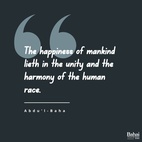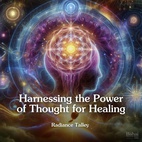The views expressed in our content reflect individual perspectives and do not represent the authoritative views of the Baha'i Faith.
As a species we human beings have a natural curiosity about the world—so we ask and have asked for countless centuries many questions.
We ask not just, what, when, where, which and whose but also how and why? This ceaseless curiosity has turned the world inside out and uncovered many hidden truths, not just about the world we inhabit, but also about human nature.
For those of us who choose the medium of religion as the ultimate authority on life, the questions asked need to satisfy not just our minds but also our souls, which yearn for deeper answers beyond the current realm of science.
For those of us who choose science as the ultimate authority, the answers sought after need to satisfy not just our intellects but also our total sense of what it means to be human. For example, according to our latest findings, biologically we are not that far removed from many other species as we share much of the same DNA. Recent DNA studies also point to our common ancestry as human beings.
From a scientific perspective, knowledge appears to be in a perpetual state of motion—what was true yesterday is apparently no longer true today. Science evolves—can the same be said for religion?
It would appear that religion has coexisted with science from the very beginning. In fact some scientists have put forward the suggestion that religion is something that is in effect hard-wired into our brains.
According to the UK Guardian Newspaper, the most recent proponent on this theme is Professor Hood of Bristol University:
I think it is pointless to think that we can get people to abandon their belief systems because they are operating at such a fundamental level … No amount of rational evidence is going to be taken on board to get people to abandon those ideas.
Dr. Hood told the annual British Association Festival of Science in Norwich that the standard bearers for evolution, such as the biologist Richard Dawkins and the philosopher Daniel Dennett, had adopted a counterproductive and “simplistic” position:
They have basically said there are two types of people in the world, those who believe in the supernatural and those who do not. But almost everyone entertains some form of irrational beliefs even if they are not religious.
In this case, Dr. Hood’s use of the word “irrational” is not a negative one—it simply means “beyond what we can rationally know.” Take the case put forward by Einstein for example:
Almost as soon as the theory of general relativity was published in 1915 it was being savaged by opponents on less-than-scientific grounds. Many opposed it because they saw it as a threat to the established order, part of the widespread social and political unrest of the time, while others were motivated by religion or anti-Semitism. That movement eventually dwindled, but has recently resurfaced in a different guise, showing that irrationality will always find a way.
If in fact religion and science are no more than two different sides of the same coin, have they then both been subject to the same forces of progressive change as expressed in the concept of evolution? According to Baha’i belief this is in fact the case, as postulated by none other than Abdu’l-Baha:
Progress is of two kinds, material and spiritual. The former is attained through observation of the surrounding existence and constitutes the foundation of civilization.
Spiritual progress is through the breaths of the Holy Spirit and is the awakening of the conscious soul of man to perceive the reality of divinity. Material progress insures the happiness of the human world. Spiritual progress insures the happiness and eternal continuance of the soul.
The prophets of God have founded the laws of divine civilization. They have been the root and fundamental source of all knowledge. They have established the principles of human brotherhood or fraternity which is of various kinds, such as the fraternity of family, of race, of nation and of ethical motives.
These forms of fraternity, these bonds of brotherhood are merely temporal and transient in association. They do not insure harmony and are usually productive of disagreement. They do not prevent warfare and strife; on the contrary they are (often) selfish, restricted and fruitful causes of enmity and hatred among mankind.
We must forsake all imitations (pseudo religion) and promote the reality of the divine teachings. In accordance with these principles and actions and by the assistance of the Holy Spirit, both material and spiritual happiness shall (then) become realized.
Until all nations and peoples become united by the bonds of the Holy Spirit in this real fraternity, until national and international prejudices are effaced in the reality of this spiritual brotherhood, true progress, prosperity and lasting happiness will not be attained by man. – The Promulgation of Universal Peace, pp. 142-143.
From a rational scientific perspective, this passage could be interpreted to mean that if we are able to view one another from a totally global standpoint and accept our universal heritage by embracing the common culture of religion, we will then be able to forsake all of our prejudices, recognize our shared humanity and live together in peace and prosperity:
This is the century [epoch] of new and universal nationhood. Sciences have advanced, industries have progressed, politics have been reformed, liberty has been proclaimed, justice is awakening. This is the century of motion, divine stimulus and accomplishment; the century of human solidarity and altruistic service; the century of Universal Peace and the reality of the divine kingdom. – Ibid., p. 143.

















Comments
Sign in or create an account
Continue with Facebookor